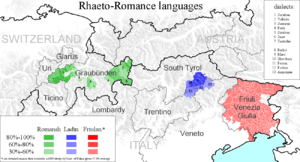Questione Ladina
The Questione Ladina is a scientific debate about how to categorise several Romance languages or dialects that are spoken in the Alps. Basically, it is dealing with the question of whether Romansh, Ladin and Friulian form a proper language subfamily or if they should be regarded as a part of a wider Northern Italian dialect continuum.
History

The beginning of the Questione Ladina is marked by the publication of the Saggi ladini by Graziadio Isaia Ascoli (1829–1907), who identified the area between the Oberalp Pass and the Gulf of Trieste as a specific language area, with some common characteristics, and called the idioms spoken there Ladin dialects. The theory gained a large circulation with the publications of the Austrian linguist Theodor Gartner, who, however, used Rhaeto-Romance instead of Ladin, as an umbrella term.[1]
The idea of a Ladin unity was strongly opposed by Carlo Battisti (1882–1977), who demonstrated, in several studies, that the whole range of dialects in question showed only a few common characteristics and was just as closely related to neighbouring Lombard and Venetian varieties. The dialectologist Carlo Salvioni held similar views.[2]
Both the idea of a distinctive language sub-family and the denial of a Ladin unity still have strong proponents, the former especially among Swiss, German and Austrian, the latter among Italian linguists.[3]
Aspects
A characteristic is the commixture of grammatical and sociolinguistic aspects, as well as of linguistic and political-ideological convictions. Battisti and Salvioni's research was influenced by sympathies for the Italian irredentism, leading to the demand that speakers of Romansh should accept Italian as a Dachsprache because of their Italianity, and subsequently to linguistically justified political claims that the Romansh-speaking Graubünden should become part of Italy.[4] On the other hand, Swiss linguists regarded mere grammatical features as subordinated to sociolinguistic and historic considerations, and they strongly supported the idea of a separate "language".[4]
References
- ↑ Ricarda Liver (1999), Rätoromanisch – Eine Einführung in das Bündnerromanische, Tübingen: Gunter Narr, ISBN 3-8233-4973-2, p. 16
- ↑ Ricarda Liver (1999), Rätoromanisch – Eine Einführung in das Bündnerromanische, Tübingen: Gunter Narr, ISBN 3-8233-4973-2, p. 16−17
- ↑ Ricarda Liver (1999), Rätoromanisch – Eine Einführung in das Bündnerromanische, Tübingen: Gunter Narr, ISBN 3-8233-4973-2, p. 18
- 1 2 Ricarda Liver (1999), Rätoromanisch – Eine Einführung in das Bündnerromanische, Tübingen: Gunter Narr, ISBN 3-8233-4973-2, p. 17